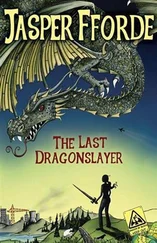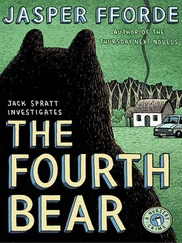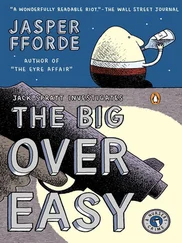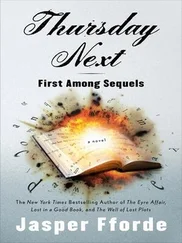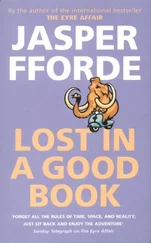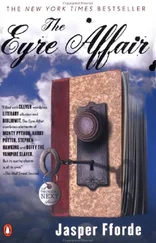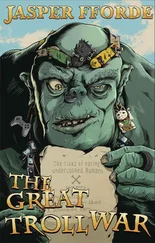‘I’m after Rabbit and Rabbitability ,’ she said. ‘Like Austen’s classic but more warren-based and with a greater emphasis on ears, sex, carrots, burrowing and sex.’
‘You said sex twice.’
‘Yes,’ said Connie, blinking twice, ‘I know.’
Rabbits aged better than humans so long as they got a chance to age at all, and she was pretty much unchanged in the thirty-odd years since I’d seen her last: smaller and slimmer than the norm, but Wildstock, the generic brown-furred variety. She wore a short spotted summer dress under a pale blue buttoned cardigan and her ears, long and elegant, carried four small silver ear-studs halfway up her right and three near the base of her left. Her most striking feature, then as now, was her eyes: both large and expressive, but while one was the brown of a fresh hazelnut, the other was pale bluey-violet, the colour of harebells.
‘Are you OK?’ she said, as I think I might have been staring.
Luckily, Neville Chamberlain chose that moment to interrupt.
‘ Rabbit and Rabbitability would be under six-three-two point six-six,’ she said, referring to the Dewey categorisation number that related to: ‘Technology/Agriculture/Pests/Disposal’. It was a predictably insulting response. She was, after all, married to Victor Mallett and the entire Mallett family’s antagonism towards any social or species group not their own was well known. It was said Mallett children were encouraged to feed the ducks solely ‘to see them fight’.
‘Actually, Mr Chamberlain,’ put in Stanley Baldwin, ‘it’s probably a six-three-six point nine-three.’ This was a little less insulting as it referred to ‘Technology/Agriculture/Domestic Animals/Rabbits’, but was equally of little use. Connie wasn’t after books about rabbits, but the range of British classics retold for rabbits, published when funding was more secure after the Spontaneous Anthropomorphic Event, when integration into society was still seen as guiding policy rather than the pipe-dream of idealistic liberals.
‘Eight-nine-nine point nine-nine, Mr Major,’ added the Sole Librarian, who didn’t much care for rabbits either but hated misuse of the Dewey Decimal System a great deal more. ‘Literature/Other Languages. Shelf nine.’
‘Let me show you,’ I said, handing the returned books to Neville, who hurried off to shelve them quickly so she could return, presumably, to air her anti-rabbit sentiments more fully. For my part I led Connie quickly towards the foreign language section.
‘Hey,’ she said with a giggle, ‘isn’t naming the team after former prime ministers a direct lift from that Kathryn Bigelow heist-gone-wrong movie?’
‘I … don’t know what you mean.’
‘Sure you do,’ she said. ‘The one with Patrick Swayze and Keanu Reeves. What’s its name again?’
‘ Point Break ,’ I said, suddenly remembering that I’d seen it first with her at the Student Union cinema. We’d sat in the back row, a place usually reserved for lovers, but we weren’t there for that reason. Rabbit cinema-goers, acutely conscious of how their often expressive ear movements can ruin a movie for anyone sitting behind, politely migrated to the back. Our upper arms had touched as we sat, which I remembered I quite liked; it was the sum total of any physical contact.
‘And,’ I concluded, ‘it’s more a homage, really.’
‘That’s the one,’ she said with a smile, ‘ Point Break. You could have disguised everyone in rubber masks, again, like in the movie.’
‘Not very practical and we don’t actually need to be disguised,’ I said, ‘and besides, while Mrs Thatcher and John Major masks are still obtainable, those of Neville Chamberlain and David Lloyd George are almost impossible to come by.’
‘I heard you could paint William Shatner masks to represent almost anyone.’
I’d heard that too, but didn’t say so.
‘There’s issues of being able to see out clearly enough,’ I said.
‘Ninety seconds!’ called out Mrs Thatcher.
‘You’re in luck,’ I said, picking a couple of dusty volumes from the shelves. ‘Are either of these the ones you wanted?’
I showed her the covers, which were written in Rabbity script, 1 1. The script looks like ‘scuffed mud’, the sort of marks you get in the back porch after inclement weather. The Rabbity alphabet, incidentally, has only six letters: N, I, R, H, U and F.
and unintelligible to me, or indeed any humans. Even after fifty-five years, no human had ever mastered anything but the most basic tenets of their language, verbal or written. Attempts by humans to converse in their mother tongue were usually met with peals of hysterical laughter, and remain one of the mainstays of rabbit comedy stand-up, along with jokes about ears, litter sizes, the broader etymological impact of ‘cuniculus’ and the hilarity that ensues when entering the wrong burrow by accident, at night, slightly drunk, during the mating season.
‘Oooh!’ said Connie, grasping one of the books tightly. ‘ Planet of the Lagomorphs. That’s a find.’
I wasn’t an expert on the whole Rabbit Literature Retelling Project of the early eighties, but I did know that out of the hundred or so titles, only one was ever banned. When you retold Planet of the Apes the dominant life form was the rabbit. It became something of a political hot potato, but not, crucially, amongst rabbits. The fledgling United Kingdom Anti-Rabbit Party declared the novel’s central theme to be ‘not conducive to good human/rabbit relations’ – and lobbied successfully to have it withdrawn and pulped.
‘Must have missed the dragnet,’ I said.
‘I’ll give it a read to the family,’ said Connie with a smile, ‘might give us some ideas.’
Rabbits rarely read to themselves as they saw books more as a performance than a solitary occupation. Why, they asked, do anything by yourself that could be shared with others?
‘Banned book?’ said Neville Chamberlain, her shelving complete and now back on the scene. She clasped hold of the volume and tried to take it away, but Connie didn’t relinquish her grip, and they both stood there, each with their hands/paws on the book, tugging backwards and forwards.
‘It was on the shelf,’ said Connie Rabbit, ‘so free to be loaned. That’s how libraries work.’
‘Don’t tell me how libraries work,’ said Neville Chamberlain, who was now talking less like someone eager to appease, and more like the Mrs Mallett reactionary she was, ‘I’ve been a library volunteer since before you munched your first carrot.’
It was a dumb insult, and they both knew it.
‘Wow,’ said Connie, ‘you got me.’
‘Forty-five seconds!’ called out Mrs Thatcher, and I was now in a quandary. If Connie now was anything like the Connie I knew then , she wasn’t going to take no for an answer, and if we overran it would be a Code 4-22: ‘Opening Time Deficit’ , which meant anything over the six minutes would be docked on the next library opening. I glanced towards where the two Library Opening Times Compliance Officers were staring at us from the door, in the same manner vultures might regard an unwell zebra.
‘Mr Major?’ said Neville Chamberlain, using her Seventeenth-Century-School-Ma’am-That-Must-Be-Obeyed voice. ‘Our library is a special place and not to be disrespected.’
‘How is it being disrespected?’ asked Connie in an even tone. ‘Really, I’d like to know.’
‘You have a serious attitude problem,’ said Mrs Mallett, taking instant umbrage at being questioned directly by a lower animal.
‘I’m so sorry,’ said Connie, ‘how is the library being disrespected – ma’am ?’
Читать дальше



